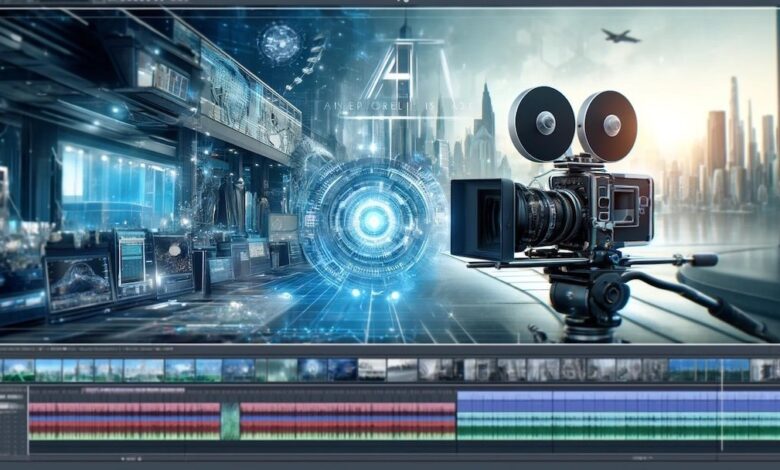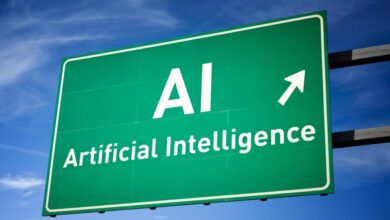Artificial Intelligence and Filmmaking | Raindance

The combination Artificial Intelligence and Filmmaking presents the most intense development since the advent of sound. In the dynamic world of filmmaking, artificial intelligence (AI) has emerged as both a formidable disruptor and an invaluable ally. As AI technology continues to evolve, its influence on the creative process and the business of filmmaking is profound, introducing a spectrum of threats and opportunities. This blog post explores the double-edged sword that AI represents for the film industry, examining its potential threats while also highlighting the revolutionary features it offers.
Check out Raindance Immersive June 1 – 28th
Threats of AI in Filmmaking
1. Job Displacement
One of the most significant concerns surrounding the integration of AI in filmmaking is the potential for job displacement. AI’s capability to automate various aspects of film production, such as editing, special effects, and even some elements of storytelling, poses a risk to traditional jobs. For instance, AI-driven software can now edit films based on set parameters, potentially reducing the need for human editors. This automation threatens to displace skilled professionals who rely on these roles for their livelihood.
2. Diminishing Human Creativity
There is a growing fear that AI might overshadow human creativity. As AI tools become more advanced, they can generate scripts, direct scenes, and even create music scores, which might lead to a formulaic approach to filmmaking. This could stifle the unique, unpredictable elements of human creativity that often lead to groundbreaking cinematic experiences.
3. Ethical and Privacy Concerns
AI in filmmaking also raises significant ethical questions, particularly concerning data privacy and the manipulation of images and videos. Deepfake technology, which uses AI to create realistic video and audio recordings of people saying or doing things they did not actually do, presents a stark example. This technology poses serious implications for consent, privacy, and the spread of misinformation.
4. Oversaturation of Content
As AI makes film production more accessible and less costly, the market could become oversaturated with content. This abundance might make it increasingly difficult for quality films to get the recognition they deserve, potentially diluting the overall quality of available cinematic works.
Features of AI in Filmmaking
1. Enhanced Visual Effects
AI significantly contributes to the field of visual effects (VFX), making them more sophisticated and less expensive to produce. AI algorithms can quickly generate realistic environments, simulate complex physical phenomena like fire, water, and smoke, and even create lifelike digital humans. This capability allows filmmakers to push the boundaries of their creative visions without the constraints of physical production costs.
2. Streamlined Production Processes
AI streamlines production processes, making filmmaking faster and more efficient. AI-driven scheduling tools can optimize shooting schedules based on actor availability, weather conditions, and other variables. Similarly, AI can manage vast amounts of footage to assist in editing, selecting the best takes or suggesting edits, which can significantly accelerate the post-production phase.
3. Democratization of Filmmaking
AI technology democratizes filmmaking by lowering the barriers to entry. With AI tools, independent filmmakers and new artists can access high-quality production tools that were previously only available to large studios. This shift not only fosters a more inclusive industry but also encourages a greater diversity of voices and stories.
4. New Avenues for Storytelling
AI opens up new avenues for storytelling, enabling creators to explore complex narratives that might be too challenging to depict manually. AI can help simulate historical events, generate futuristic settings, or create entire worlds with coherent ecosystems and physics rules. Moreover, interactive storytelling, where the narrative changes based on viewer choices, can be enhanced through AI, offering audiences a unique and personalized viewing experience.
Conclusion
The integration of AI into filmmaking is transforming the industry in unprecedented ways. While the threats posed by this technology, such as job displacement, ethical concerns, and potential stifling of creativity, are non-negligible, the innovative features it offers can enhance the artistic and technical aspects of film production. As we navigate this new landscape, it is crucial for filmmakers, stakeholders, and regulatory bodies to foster an environment where the benefits of AI can be harnessed responsibly and ethically, ensuring that the art of filmmaking continues to thrive in the age of technology.
Resources
Here the sources I tiurn to when I need to do AI research. These sites and sources cater to various interests and expertise levels. Here are some top ones:
• ArXiv:
A repository of scientific papers across various fields, including AI and machine learning. It’s a great place to find the latest research papers and preprints.
• Google Scholar:
A freely accessible web search engine that indexes the full text or metadata of scholarly literature across an array of disciplines. It’s particularly useful for finding academic papers and citations related to AI research.
• IEEE Xplore:
This digital library provides access to scientific and technical content published by the IEEE (Institute of Electrical and Electronics Engineers) and its publishing partners. It’s a valuable resource for accessing AI-related journals, conference proceedings, and standards.
• Journals:
• Conferences:
• Books:
• Open Source Repositories:
GitHub hosts numerous open-source AI projects, libraries, and frameworks. Browsing through repositories like TensorFlow, PyTorch, and scikit-learn can provide valuable insights into real-world implementations and best practices.
• Blogs and Newsletters:
• Social Media and Online Communities:
Fade Out
Why not attend this year’s Raindance in London from June 19 -28th?
Let Raindance guide your career:
A taster evening; 99 Minute Film School – a single evening explaining how the film industry works.
A taster One Day Masterclass: Saturday Film School – discover the ins-and-outs of writing, directing and producing a film in an information packed and entertaining day
The Raindance 2 year Higher National Degree: a students entry point to Higher Education
Study filmmaking or acting over 2 years at one of our 3 international campus’! This is a full-time University level course. Through Raindance, students will have the opportunity to attend renowned courses delivered by industry professionals and attend our networking events to develop further opportunities.
The Raindance BA in Filmmaking or Performance: The Raindance Film School Top-Up BA (Hons) in Film and Performing Arts Practices is a one year practical course. It’s been designed to provide aspiring, and existing, Film and Performing Arts practitioners the opportunity to develop their existing academic or professional experience up to BA level in a chosen pathway or pathways (producing, directing, screenwriting or acting).
The Raindance MA: Study your MA in Filmmaking or Screenwriting at Raindance Film School (accredited by De Montfort University). They are 21st-century degrees for filmmakers, entrepreneurs, creatives and future academics wishing to upskill or transition into the film and digital media industry. These programmes provides a unique opportunity for you to benefit from the experience of Industry Experts across the world, whilst developing your personal professional practice, as well as your research and independent study skills.



